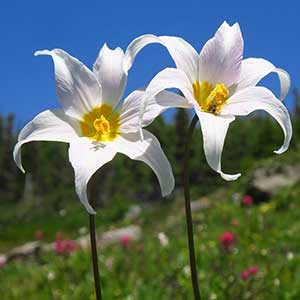Erythronium montanum
Erythronium taylorii
avalanche-lily, white avalanche-lily, white glacier lily
pilot ridge fawn lily, Taylor's fawn-lily
narrowly ovoid, 25–60 mm.
narrowly ovoid, 40–70 mm, often forming sessile offsets.
10–20 cm;
blade green, ovate to broadly lanceolate, base ± abruptly narrowed to petiole, margins wavy.
18–35 cm;
blade green, elliptic to oblanceolate, margins wavy.
12–35 cm.
25–40 cm.
1–3-flowered.
1–4(–8)-flowered.
tepals white to creamy white with bright yellow zone at base, broadly ovate to broadly lanceolate, 25–45 mm, inner wider than outer, auriculate at base, length less than 4 times width;
stamens 12–24 mm;
filaments white, linear, slender, less than 0.8 mm wide;
anthers bright yellow;
style white, 13–25 mm;
stigma with slender, usually recurved lobes 1–5 mm.
tepals white, proximal 1/2–2/3 bright yellow, becoming pinkish in age, lanceolate, 25–45 mm, inner auriculate at base;
stamens 10–16 mm;
filaments yellow, slender;
anthers cream colored;
style white to cream, 9–11 mm;
stigma ± unlobed or with lobes shorter than 1 mm.
oblong, 3–6 cm.
obovoid, 2–4 cm.
= 24.
Erythronium montanum
Erythronium taylorii
This species occurs in the Coast Ranges of southern British Columbia, and disjunctly to southern Vancouver Island, the Olympic Peninsula, and Cascade Mountains from Mount Rainier National Park in Washington to central Oregon.
(Discussion copyrighted by Flora of North America; reprinted with permission.)
Erythronium taylorii is known only from Tuolumne County in the central Sierra Nevada.
(Discussion copyrighted by Flora of North America; reprinted with permission.)


